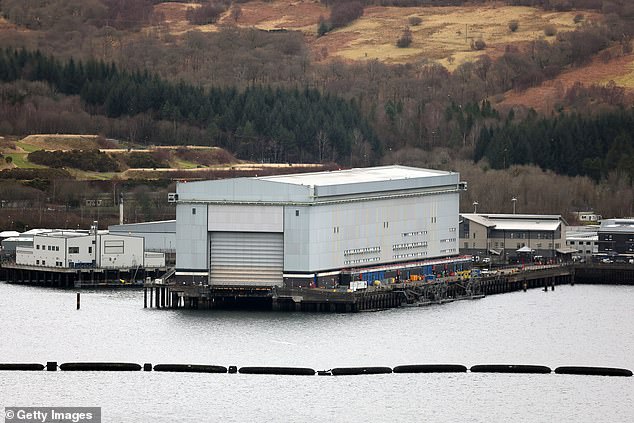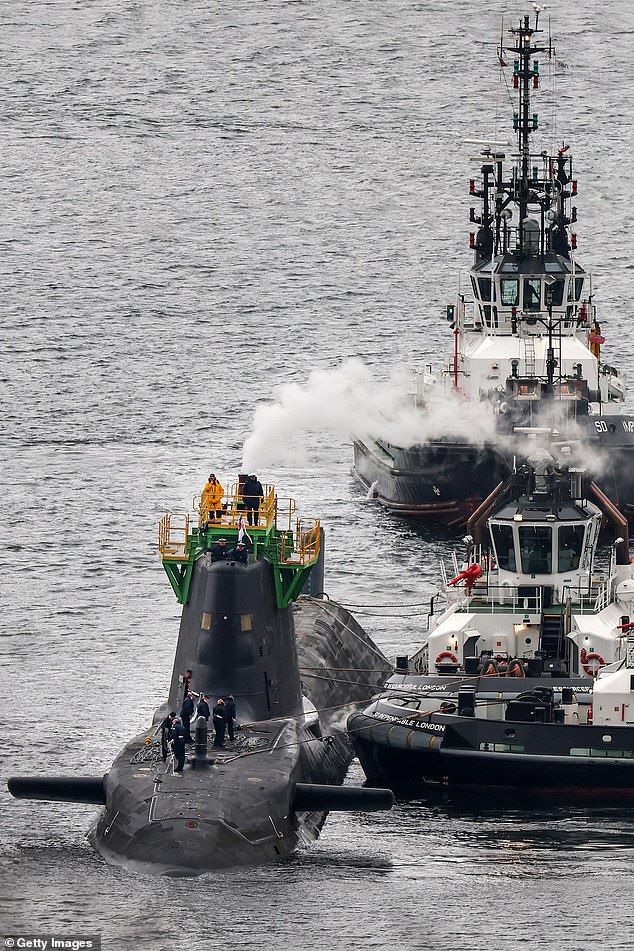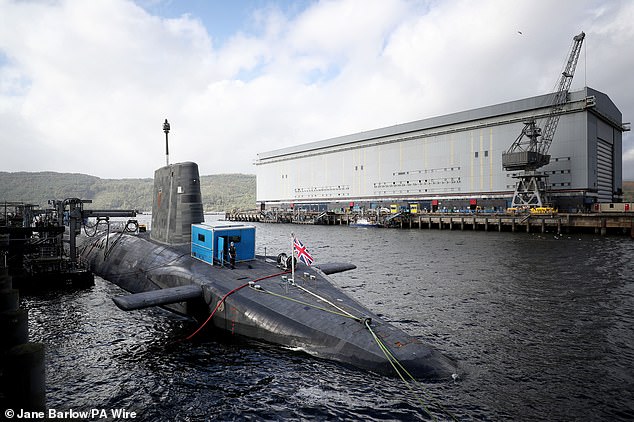A serious nuclear incident took place at Britain’s Trident submarine base in Scotland earlier this year, it has emerged.
There was a Category A event at HMNB Clyde on Gare Loch in Faslane between January and April.
The Ministry of Defence (MoD) defines a Category A incident as the most serious and those which carry an ‘actual or high potential for radioactive release to the environment’.
But the government department has insisted the incident at HMNB Clyde did not pose a risk to the public or result in any radiological impact to the environment.
The naval base is the Royal Navy’s headquarters in Scotland and is home to Britain’s nuclear submarines which includes the Vanguard vessels armed with Trident missiles.

A serious nuclear incident took place at Britain’s Trident submarine base, HMNB Clyde, in Scotland earlier this year, it has emerged

The naval base is the Royal Navy’s headquarters in Scotland and is home to Britain’s nuclear submarines which includes the Vanguard vessels armed with Trident missiles
The Category A event, which was first reported by The Herald, will raise concerns over the maintenance of the weapons at the facility.
It was revealed in a written parliamentary answer by defence procurement minister Maria Eagle after she was asked to provide the number of Nuclear Site Event Reports (NSERs) at the Faslane and Coulport naval bases.
NSERs detail incidents at nuclear facilities and are categorised based on their safety significance and impact.
She disclosed that there had been a category A event at Faslane between January 1 and April 22 as well as two category B, seven category C and four category D incidents.
Ms Eagle added that there were five further events deemed ‘below scale’ and less serious.
While Coulport, where Britain’s nuclear missiles and warheads are held, experienced four category C and nine category D events during the same period.
The SNP has demanded an urgent explanation from the government over a ‘catalogue of failures’ which include a separate contamination nearby.
‘I cannot provide specific detail for the events as disclosure would, or would be likely to, prejudice the capability, effectiveness or security of any relevant forces,’ Ms Eagle told SNP MP Dave Doogan who tabled the question.
‘I can assure the honourable member that none of the events listed in question 49938 caused harm to the health of any member of staff or to any member of the public and none have resulted in any radiological impact to the environment.’

Coulport armaments depot holds the Royal Navy’s supply of nuclear warheads for its fleet of Trident submarines, above, which are based HMNB Clyde at Faslane, near Helensburgh
The minister insisted that NSERs ‘are raised to foster a robust safety culture that learns from experience, whether that is equipment failures, human error, procedural failings, documentation shortcoming or near-misses’.
The incident is the second serious one to take place at Faslane naval base in two years after a Category A event was recorded in 2023. And there were two similar events between 2006 and 2007.
It comes after it was revealed that radioactive water was released from the Royal Navy nuclear weapons base in Coulport into Loch Long after several old pipes burst.
The substances leaked into the water because the Royal Navy inadequately maintained a network of around 1,500 pipes on the base, according to a regulator.
‘Nuclear weapons are an ever-present danger and this new information is deeply worrying,’ SNP deputy leader Keith Brown said.
‘With repeated reports of serious incidents at Faslane and now confirmed radioactive contamination in Loch Long, it’s clear there is a direct threat to our environment, our communities, and our safety.
‘Worse still, the Labour government is refusing to provide any details about the Category A incident, or the full extent of the contamination, including who could potentially be affected.
‘While Westminster ploughs billions of public money into weapons of mass destruction, the SNP is focused on building a better Scotland.
‘But only with independence, can we scrap Trident, clean up the mess it has left behind, and ensure this kind of reckless nuclear policy is never forced on Scotland again.’
An MoD spokesman said: ‘We place the utmost importance on handling radioactive substances safely and securely. Nuclear Site Event Reports demonstrate our robust safety culture and commitment to learn from experience.
‘The incidents posed no risk to the public and did not result in any radiological impact to the environment. It is factually incorrect to suggest otherwise. Our Government backs our nuclear deterrent as the ultimate guarantor of our national security.’












